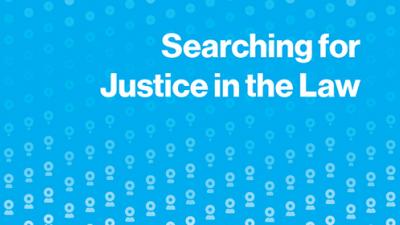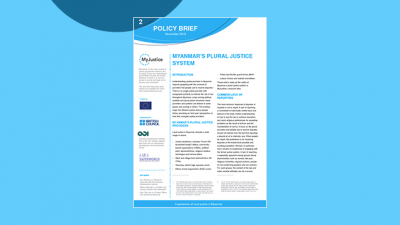-
Several MyJustice partners undertook case documentations of women’s experience of navigating justice systems in Myanmar, for a range of different issues. Myanmar versions of these documentations are...
Women’s Experience of the Law in Myanmar: A documentation of select cases (4)
Several MyJustice partners undertook case documentations of women’s experience of navigating justice systems in Myanmar, for a range of different issues. Myanmar versions of these documentations are downloadable from the links below. An English synthesis is forthcoming.
-
Several MyJustice partners undertook case documentations of women’s experience of navigating justice systems in Myanmar, for a range of different issues. Myanmar versions of these documentations are...
Women’s Experience of the Law in Myanmar: A documentation of select cases (5)
Several MyJustice partners undertook case documentations of women’s experience of navigating justice systems in Myanmar, for a range of different issues. Myanmar versions of these documentations are downloadable from the links below. An English synthesis is forthcoming.
-
Myanmar Justice Survey 2017: Policy Brief
-
The multitude of justice challenges confronting people in Myanmar means that there is significant scope for, and interest in, rule of law and access to justice programmes among both foreign and...
Understandings of Justice in Myanmar
The multitude of justice challenges confronting people in Myanmar means that there is significant scope for, and interest in, rule of law and access to justice programmes among both foreign and domestic actors. While attention to justice concerns is welcome, there is a danger of taking for granted that there are shared and agreed understandings about the meaning of justice and its role in society.
-
Understanding justice provision in Myanmar requires grappling with the universe of providers that people use to resolve disputes. There is no single justice provider with recognised authority to...
Myanmar’s Plural Justice System
Understanding justice provision in Myanmar requires grappling with the universe of providers that people use to resolve disputes. There is no single justice provider with recognised authority to enforce the rule of law throughout Myanmar. Long-running political conflicts and plural power structures mean providers and systems are distinct in some places and overlap in others. This briefing maps the different justice chains people follow, providing an ‘end-user’ perspective on how they navigate justice providers.
-
People in Myanmar face a wide range of justice problems, from land disputes to drug trafficking to violence against women. Yet in MyJustice research, debt disputes emerged as the most common dispute...
Debt Disputes in Myanmar
People in Myanmar face a wide range of justice problems, from land disputes to drug trafficking to violence against women. Yet in MyJustice research, debt disputes emerged as the most common dispute people spoke of, affecting large numbers of people in both Mon State and Yangon Region (Denney et al., 2016). Yet debt disputes have been largely overlooked to date. They highlight the importance and challenge of equitable access to credit in a transitioning country like Myanmar, without which there are both justice and developmental consequences. As with most justice problems, debt disputes and a lack of formal credit access affect the poor and vulnerable most acutely.

